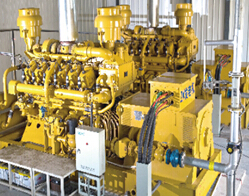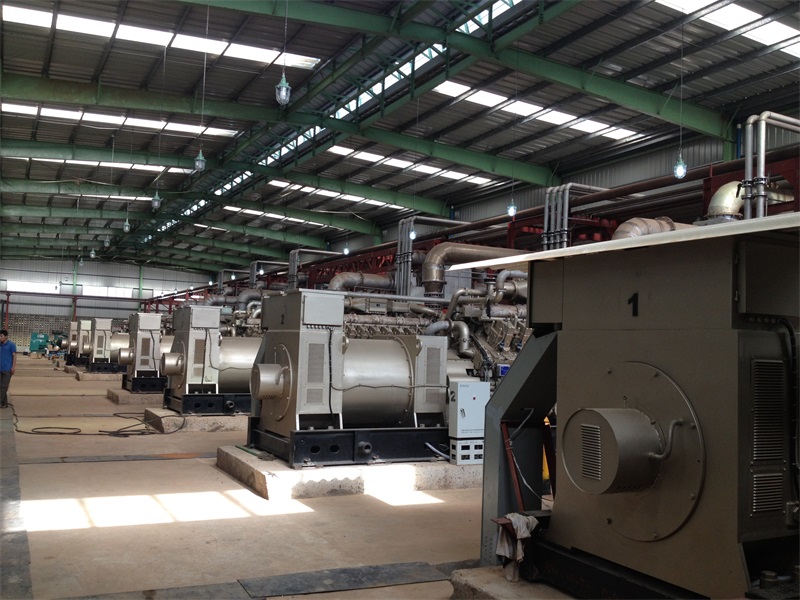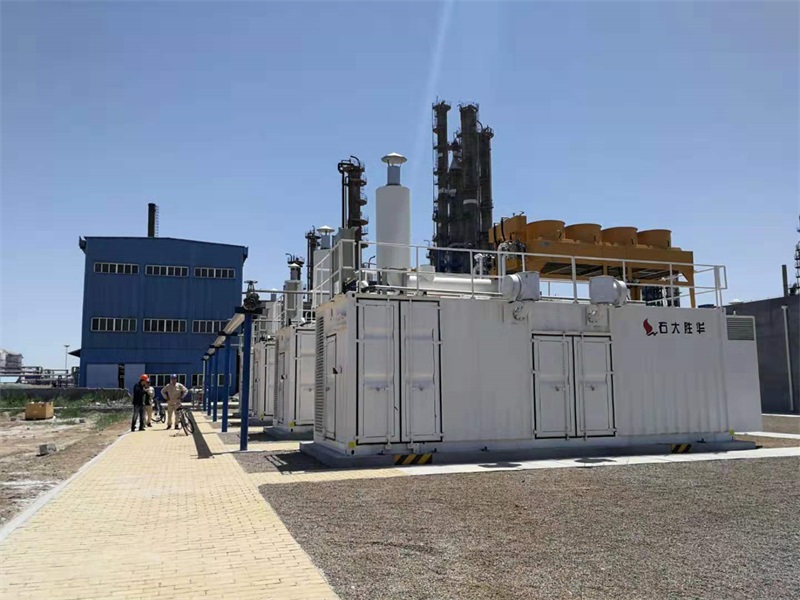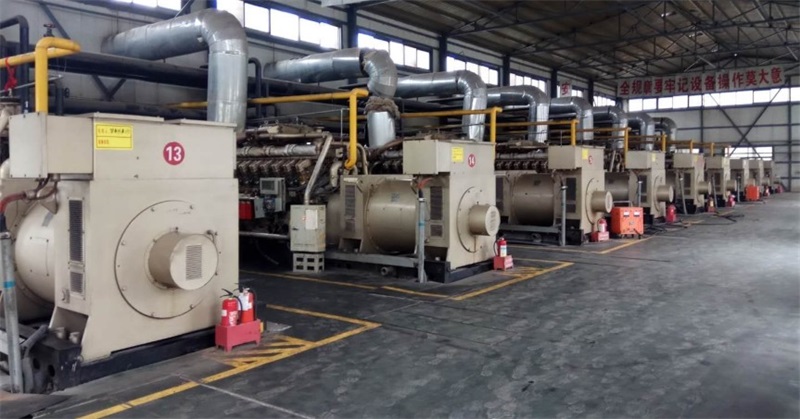驅(qū)動沼氣發(fā)電機組發(fā)電的過程有哪些?
沼氣發(fā)電技術(shù)是集環(huán)保和節(jié)能于一體的能源綜合利用新技術(shù),它是利用工業(yè)、農(nóng)業(yè)或城鎮(zhèn)生活中的大量有機廢棄物(例如酒糟液、禽畜糞、城市垃圾、餐廚垃圾和各類工業(yè)有機污水等),經(jīng)厭氧發(fā)酵處理產(chǎn)生的沼氣,驅(qū)動沼氣發(fā)電機組發(fā)電,并可充分將發(fā)電機組的余熱用于沼氣生產(chǎn)。
Biogas power generation technology is a new energy comprehensive utilization technology that integrates environmental protection and energy conservation. It utilizes a large amount of organic waste in industry, agriculture, or urban life (such as distiller's grains, livestock manure, urban garbage, kitchen waste, and various industrial organic wastewater), and produces biogas through anaerobic fermentation treatment to drive the biogas generator unit to generate electricity, and can fully utilize the waste heat of the generator unit for biogas production.
沼氣發(fā)電熱電聯(lián)產(chǎn)項目的熱效率,視發(fā)電設(shè)備的不同而有較大的區(qū)別,如使用燃?xì)鈨?nèi)燃機,其熱效率為70%~75%之間,而如使用燃?xì)馔钙胶陀酂徨仩t,在補燃的情況下,熱效率可以達到90%以上。
The thermal efficiency of biogas cogeneration projects varies greatly depending on the type of power generation equipment used. For example, if a gas internal combustion engine is used, its thermal efficiency ranges from 70% to 75%. However, if a gas turbine and waste heat boiler are used, the thermal efficiency can reach over 90% with supplementary combustion.
沼氣發(fā)電技術(shù)本身提供的是清潔能源,不僅解決了沼氣工程中的環(huán)境問題、消耗了大量廢棄物、保護了環(huán)境、減少了溫室氣體的排放,而且變廢為寶,產(chǎn)生了大量的熱能和電能,符合能源再循環(huán)利用的環(huán)保理念,同時也帶來巨大的經(jīng)濟效益:


The biogas power generation technology itself provides clean energy, which not only solves environmental problems in biogas engineering, consumes a large amount of waste, protects the environment, and reduces greenhouse gas emissions, but also turns waste into treasure, generating a large amount of heat and electricity, in line with the environmental protection concept of energy recycling and utilization, and also brings huge economic benefits:
1、受環(huán)境限制小。沼氣發(fā)電機組的規(guī)模比較小,對場地的要求不高,只要有沼氣產(chǎn)生的地方基本上都可以進行發(fā)電。不像水電一定建立在水力資源豐富的地方,而且還要考慮電站對周圍生 態(tài)環(huán)境的影響;太陽能發(fā)電要建在日照時間長且比較偏僻的地方,因為太陽能發(fā)電要占用大量的土地,一定考慮項目的經(jīng)濟性。
1. Limited by the environment. The scale of biogas generators is relatively small, and the requirements for the site are not high. As long as there is a place where biogas is generated, it can basically generate electricity. Unlike hydropower, which is always built in areas with abundant hydraulic resources, and also takes into account the impact of power stations on the surrounding ecological environment; Solar power generation should be built in remote areas with long sunshine hours, as it requires a large amount of land and must consider the economic viability of the project.
2、可再生,污染少。用沼氣進行發(fā)電,不用擔(dān)心會有枯竭的。據(jù)統(tǒng)計,至2002年底世界剩余石油探明儲量為1407.04億噸。根據(jù)世界已探明的化石能源儲量推算,石油還可使用40~50年,天然氣還可使用60~70年,煤炭則能維持225年左右。可見,說明化石能源離我們而去的日子已不遠(yuǎn)。而以沼氣為代表的生物質(zhì)能源的壽命幾乎是無限的,只要太陽存在,沼氣也將存在。
2. Renewable, with less pollution. Using biogas for power generation, there is no need to worry about depletion. According to statistics, by the end of 2002, the world's remaining proven oil reserves were 140.704 billion tons. According to the world's proven fossil energy reserves, oil can be used for another 40-50 years, natural gas can be used for another 60-70 years, and coal can last for about 225 years. It can be seen that the days when fossil fuels are gone are not far away. The lifespan of biomass energy represented by biogas is almost infinite, as long as the sun exists, biogas will also exist.
3、原料來源廣泛。沼氣發(fā)電機組的主要燃燒成分是甲烷,由甲烷產(chǎn)生菌厭氧消化有機物產(chǎn)生。所以只要有機物存在的地方,再配以適合的環(huán)境條件,就會有甲烷的生成。例如人畜的糞便、有機工業(yè)廢水、垃圾填埋場、農(nóng)作物秸稈、餐廚垃圾等都可用做沼氣產(chǎn)生的原材料。今后隨著畜禽養(yǎng)殖業(yè)和工業(yè)企業(yè)的發(fā)展,沼氣的生產(chǎn)量還會增加.
3. The source of raw materials is extensive. The main combustion component of biogas generators is methane, which is produced by anaerobic digestion of organic matter by methane producing bacteria. So as long as organic matter is present and suitable environmental conditions are in place, methane will be generated. For example, human and animal manure, organic industrial wastewater, landfills, crop straw, kitchen waste, etc. can all be used as raw materials for biogas production. In the future, with the development of animal husbandry and industrial enterprises, the production of biogas will continue to increase
下一篇: 沼氣發(fā)電機組沼氣池安全使用要點!
 在線咨詢
在線咨詢 官方二維碼
官方二維碼




 當(dāng)前位置:
當(dāng)前位置: 2023.11.30
2023.11.30









